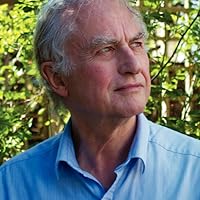Dawkins Quotes
Quotes tagged as "dawkins"
Showing 1-30 of 32

“I agree with people like Richard Dawkins that mankind felt the need for creation myths. Before we really began to understand disease and the weather and things like that, we sought false explanations for them. Now science has filled in some of the realm – not all – that religion used to fill.”
―
―

“Let's say that the consensus is that our species, being the higher primates, Homo Sapiens, has been on the planet for at least 100,000 years, maybe more. Francis Collins says maybe 100,000. Richard Dawkins thinks maybe a quarter-of-a-million. I'll take 100,000. In order to be a Christian, you have to believe that for 98,000 years, our species suffered and died, most of its children dying in childbirth, most other people having a life expectancy of about 25 years, dying of their teeth. Famine, struggle, bitterness, war, suffering, misery, all of that for 98,000 years.
Heaven watches this with complete indifference. And then 2000 years ago, thinks 'That's enough of that. It's time to intervene,' and the best way to do this would be by condemning someone to a human sacrifice somewhere in the less literate parts of the Middle East. Don't lets appeal to the Chinese, for example, where people can read and study evidence and have a civilization. Let's go to the desert and have another revelation there. This is nonsense. It can't be believed by a thinking person.
Why am I glad this is the case? To get to the point of the wrongness of Christianity, because I think the teachings of Christianity are immoral. The central one is the most immoral of all, and that is the one of vicarious redemption. You can throw your sins onto somebody else, vulgarly known as scapegoating. In fact, originating as scapegoating in the same area, the same desert. I can pay your debt if I love you. I can serve your term in prison if I love you very much. I can volunteer to do that. I can't take your sins away, because I can't abolish your responsibility, and I shouldn't offer to do so. Your responsibility has to stay with you. There's no vicarious redemption. There very probably, in fact, is no redemption at all. It's just a part of wish-thinking, and I don't think wish-thinking is good for people either.
It even manages to pollute the central question, the word I just employed, the most important word of all: the word love, by making love compulsory, by saying you MUST love. You must love your neighbour as yourself, something you can't actually do. You'll always fall short, so you can always be found guilty. By saying you must love someone who you also must fear. That's to say a supreme being, an eternal father, someone of whom you must be afraid, but you must love him, too. If you fail in this duty, you're again a wretched sinner. This is not mentally or morally or intellectually healthy.
And that brings me to the final objection - I'll condense it, Dr. Orlafsky - which is, this is a totalitarian system. If there was a God who could do these things and demand these things of us, and he was eternal and unchanging, we'd be living under a dictatorship from which there is no appeal, and one that can never change and one that knows our thoughts and can convict us of thought crime, and condemn us to eternal punishment for actions that we are condemned in advance to be taking. All this in the round, and I could say more, it's an excellent thing that we have absolutely no reason to believe any of it to be true.”
―
Heaven watches this with complete indifference. And then 2000 years ago, thinks 'That's enough of that. It's time to intervene,' and the best way to do this would be by condemning someone to a human sacrifice somewhere in the less literate parts of the Middle East. Don't lets appeal to the Chinese, for example, where people can read and study evidence and have a civilization. Let's go to the desert and have another revelation there. This is nonsense. It can't be believed by a thinking person.
Why am I glad this is the case? To get to the point of the wrongness of Christianity, because I think the teachings of Christianity are immoral. The central one is the most immoral of all, and that is the one of vicarious redemption. You can throw your sins onto somebody else, vulgarly known as scapegoating. In fact, originating as scapegoating in the same area, the same desert. I can pay your debt if I love you. I can serve your term in prison if I love you very much. I can volunteer to do that. I can't take your sins away, because I can't abolish your responsibility, and I shouldn't offer to do so. Your responsibility has to stay with you. There's no vicarious redemption. There very probably, in fact, is no redemption at all. It's just a part of wish-thinking, and I don't think wish-thinking is good for people either.
It even manages to pollute the central question, the word I just employed, the most important word of all: the word love, by making love compulsory, by saying you MUST love. You must love your neighbour as yourself, something you can't actually do. You'll always fall short, so you can always be found guilty. By saying you must love someone who you also must fear. That's to say a supreme being, an eternal father, someone of whom you must be afraid, but you must love him, too. If you fail in this duty, you're again a wretched sinner. This is not mentally or morally or intellectually healthy.
And that brings me to the final objection - I'll condense it, Dr. Orlafsky - which is, this is a totalitarian system. If there was a God who could do these things and demand these things of us, and he was eternal and unchanging, we'd be living under a dictatorship from which there is no appeal, and one that can never change and one that knows our thoughts and can convict us of thought crime, and condemn us to eternal punishment for actions that we are condemned in advance to be taking. All this in the round, and I could say more, it's an excellent thing that we have absolutely no reason to believe any of it to be true.”
―

“Richard Dawkins regards faith as an evil to be eliminated; he takes all religious faith to be blind faith. (Dawkins says) ‘Scientific belief is based on publicly checkable evidence, religious faith not only lacks evidence, its independence from evidence is its joy, shouted from the rooftops.’ However, taking Dawkins own advice we ask: where is the evidence that religious faith is not based on evidence? Mainstream Christianity will insist that faith and evidence are inseparable. Indeed, faith is a response to evidence, not a rejoicing in the absence of evidence. The apostle Paul says what many pioneers of modern science believed, that nature itself is part of the evidence for the existence of God ,‘ Since the creation of the world, God’s invisible qualities- his eternal power and divine nature – have been clearly seen, being understood from what has been made. So that men are without an excuse.’ Dawkins’ definition of faith turns out to be the direct opposite of the biblical one. Curious that he does not seem to be aware of the discrepancy.”
―
―

“Survival machines that can simulate the future are one jump ahead of survival machines who can only learn on the basis of overt trial and error. The trouble with overt trial is that it takes time and energy. The trouble with overt error is that it is often fatal. Simulation is both safer and faster. The evolution of the capacity to simulate seems to have cumulated in subjective consciousness.”
―
―

“God is not an alternative to science as an explanation, he is not to be understood merely as a God of the gaps, he is the ground of all explanation: it is his existence which gives rise to the very possibility of explanation, scientific or otherwise. It is important to stress this because influential authors such as Richard Dawkins will insist on conceiving of God as an explanatory alternative to science – an idea that is nowhere to be found in theological reflection of any depth. Dawkins is therefore tilting at a windmill - dismissing a concept of God that no serious thinker believes in anyway. Such activity is not necessarily to be regarded as a mark of intellectual sophistication.”
― God's Undertaker: Has Science Buried God?
― God's Undertaker: Has Science Buried God?

“I’ve often wondered how the term “'New Atheism”' gained such currency. It is a misnomer. There is nothing new about nonbelief. All of us, without exception, are born knowing nothing of God or gods, and acquire notions of religion solely through interaction with others – or, most often, indoctrination by others, an indoctrination usually commencing well before we can reason. Our primal state is, thus, one of nonbelief. The New Atheists (most prominently Richard Dawkins, Sam Harris and the late Christopher Hitchens) have, in essence, done nothing more than try to bring us back to our senses, to return us to a pure and innate mental clarity.”
―
―

“Os livros de física podem ser complicados, mas eles, assim como os carros e os computadores, são produtos de objetos biológicos - cérebros humanos. Os objetos e os fenômenos que um livro de física descreve são mais simples que uma única célula do corpo de seu autor. E o autor consiste em trilhões de células, muitas delas diferentes umas das outras, organizadas com arquitetura intrincada e engenharia de precisão para formar uma máquina capaz de escrever um livro.”
― The Blind Watchmaker: Why the Evidence of Evolution Reveals a Universe Without Design
― The Blind Watchmaker: Why the Evidence of Evolution Reveals a Universe Without Design
“The problem with ID, of course, is that it leaves open the possibility that the intelligence behind nature may have a moral interest in us, having communicated already with humanity in the past, and might try to boss you around in your private affairs.
With hypothetical advanced aliens residing at a safely distant address in the hypothetical multiverse, that is - to the relief of folks like Gribbin, Dawkins and the New Scientist - manifestly not the case.”
―
With hypothetical advanced aliens residing at a safely distant address in the hypothetical multiverse, that is - to the relief of folks like Gribbin, Dawkins and the New Scientist - manifestly not the case.”
―

“O darwinismo é uma teoria de processos cumulativos tão lentos que se desenrolam ao longo de milhares e milhões de anos. Todos os nossos juízos intuitivos sobre o que é provável mostram-se errados por larga margem.”
― The Blind Watchmaker: Why the Evidence of Evolution Reveals a Universe Without Design
― The Blind Watchmaker: Why the Evidence of Evolution Reveals a Universe Without Design
“There is yet another class that, having found that their own religion not only prevents free thinking but that some of its philosophies are also against some basic social, economic and scientific concepts of life as required by the progressive society, comes to the illogical conclusion that all religions similarly thwart the growth of progressive societies... Such people fall easy prey to materialism and denounce all religions without having any definite idea of any religion at all.”
― A Comparative Study of the Religions of Today
― A Comparative Study of the Religions of Today

“I simply would not accede to being forced into this, and would frequently be kept out of classes because of irreverent comments and mocking this religious stuff. Frankly, it stayed with me to this day. In fact, don't get me going. I'm almost as bad as Richard Dawkins on this issue.”
―
―

“Evolution by natural selection is the explanation for why we exist. It is not something to guide our lives in our own society. If we were to be guided by the evolution principle, then we would be living in a kind of ultra-Thatcherite, Reaganite society.”
“Study your Darwinism for two reasons,” he implored, “because it explains why you’re here, and the second reason is, study your Darwinism in order to learn what to avoid in setting up society. What we need is a truly anti-Darwinian society. Anti-Darwinian in the sense that we don’t wish to live in a society where the weakest go to the wall, where the strongest suppress the weak, and even kill the weak. We — I, at least — do not wish to live in that kind of society. I want to live in the sort of society where we take care of the sick, where we take care of the weak, take care of the oppressed, which is a very anti-Darwinian society.”
―
“Study your Darwinism for two reasons,” he implored, “because it explains why you’re here, and the second reason is, study your Darwinism in order to learn what to avoid in setting up society. What we need is a truly anti-Darwinian society. Anti-Darwinian in the sense that we don’t wish to live in a society where the weakest go to the wall, where the strongest suppress the weak, and even kill the weak. We — I, at least — do not wish to live in that kind of society. I want to live in the sort of society where we take care of the sick, where we take care of the weak, take care of the oppressed, which is a very anti-Darwinian society.”
―

“Who gave the decisive deathblow to the argument from design on the basis of biological complexity? Both philosophers and biologists are divided on this point (Oppy 1996; Dawkins 1986; Sober 2008). Some have claimed that the biological design argument did not falter until Darwin provided a proper naturalistic explanation for adaptive complexity; others maintain that David Hume had already shattered the argument to pieces by sheer logical force several decades earlier, in his Dialogues Concerning Natural Religion (Hume 2007 [1779]). Elliott Sober has been among the philosophers who maintain that, as Hume was not in a position to offer a serious alternative explanation of adaptive complexity, it is hardly surprising that 'intelligent people strongly favored the design hypothesis' (Sober 2000, 36). In his most recent book, however, Sober (2008) carefully develops what he thinks is the most charitable reconstruction of the design argument, and proceeds to show why it is defective for intrinsic reasons (for earlier version of this argument, see Sober 1999, 2002). Sober argues that the design argument can be rejected even without the need to consider alternative explanations for adaptive complexity (Sober 2008, 126): 'To see why the design argument is defective, there is no need to have a view as to whether Darwin’s theory of evolution is true' (Sober 2008, 154).”
―
―
“Slow down. The Taliban were religious, in the sense that in their opinion a being called Allah really designed and created the world and everything in it, including them. They were also a cultus in that they believed that you should pray five times a day, study the Koran, fast during Ramadan, give a tenth of your income to the poor and visit Mecca at least once in your lifetime. It is a matter of record that they had the ancient statues at Bamyan destroyed.
But Professor, who put up the statues? Buddhist monks, that's who. Possibly the monks were not religious, in the sense that they didn't believe in a designer-God but they were certainly part of a cultus and they had lots and lots of supernatural beliefs which you would think were Bad Things. So what you should have said is "Imagine no Taliban to blow up ancient statues. Imagine no ancient statues for the Taliban to blow up." This is absolutely emblematic of your confused attitude. When a religious organisation does something which annoys you, you take it for granted that it was Caused By Religion. But when a religious organisation does something which you quite like you don't think that "religion" had anything to do with it. You hardly spot that there was any religion involved at all.”
― Where Dawkins Went Wrong
But Professor, who put up the statues? Buddhist monks, that's who. Possibly the monks were not religious, in the sense that they didn't believe in a designer-God but they were certainly part of a cultus and they had lots and lots of supernatural beliefs which you would think were Bad Things. So what you should have said is "Imagine no Taliban to blow up ancient statues. Imagine no ancient statues for the Taliban to blow up." This is absolutely emblematic of your confused attitude. When a religious organisation does something which annoys you, you take it for granted that it was Caused By Religion. But when a religious organisation does something which you quite like you don't think that "religion" had anything to do with it. You hardly spot that there was any religion involved at all.”
― Where Dawkins Went Wrong

“لو كان للأطباء إدراك دارويني للأمور عندما اخترع البنسلين، كانوا ليتوقعوا مقاومة البكتيريا للمضادات الحيوية والتي تتطور بسرعة كبيرة.”
―
―

“The more statistically improbable a thing is, the less we can believe it just happened by blind chance...the obvious alternative to chance is an Intelligent Designer.”
―
―
“Dawkins mentioned two mechanisms: the theory of the ‘primeval soup’ and the Cairns-Smith theory. He discussed the latter in some detail. Since no one has computed, for either theory, the chances of the events occurring, Dawkins could not tell us what those chances are. The mechanisms of both theories, however, have every appearance of being very improbably – even to the point of being impossible.”
―
―
“Dawkins’s advice shows that he didn’t understand probability. . . . Dawkins said that a creature the lives millions of years would have a different feeling for the meaning of the chance of an event than we have. If the alien lives a hundred million years, he could have played very many hands of bridge Then, Dawkins said, it would not be unusual for him to see a ‘perfect’ bridge hand where each player was dealt thirteen cards of the same suit. ‘They will expect to be dealt a perfect bridge hand from time to time, and will scarcely trouble to write home about it when it happens.’
He’s wrong. One can easily calculate the chance of Dawkins’s alien experiencing a perfect bridge hand at least once in his lifetime. The shance of getting such a hand in one deal is 4.47 x [10 to the minus 28th power]. If the alien plays 100 bridge hands every day of his life for 100 million years, he would play about 3.65 x [10 to the 12th power] hands. The chance of his seeing a perfect hand at least once in his life is then 1.63 x [10 to the minus 15th power], or about one chance in a quadrillion. That’s less than Dawkins’’ chance of coming to New York for two weeks and winning the lottery twice in a row. Would he bother to write home about it?”
―
He’s wrong. One can easily calculate the chance of Dawkins’s alien experiencing a perfect bridge hand at least once in his lifetime. The shance of getting such a hand in one deal is 4.47 x [10 to the minus 28th power]. If the alien plays 100 bridge hands every day of his life for 100 million years, he would play about 3.65 x [10 to the 12th power] hands. The chance of his seeing a perfect hand at least once in his life is then 1.63 x [10 to the minus 15th power], or about one chance in a quadrillion. That’s less than Dawkins’’ chance of coming to New York for two weeks and winning the lottery twice in a row. Would he bother to write home about it?”
―
“I suggested in my last sermon that if Oolon Colluphid had tracked down the "God" who had left a message in five mile high letters of fire on the Quentulus Quazgar Mountains, he still wouldn't have found the person who actually created the The Hitchhiker's Guide to the Galaxy – namely, Douglas Adams. Dorothy L. Sayers pressed the idea that "God is like an author" quite hard, and C.S. Lewis practically broke it. It's also been used by Mr Grant Morrison and Mr David Sim. But seriously. You "brights" will understand us Christians much better once you've grasped that when we talk about "God", we are thinking of something much less like a fairy and much more like a Douglas.”
― Where Dawkins Went Wrong
― Where Dawkins Went Wrong

“Evolution by natural selection is the explanation for why we exist. It is not something to guide our lives in our own society. If we were to be guided by the evolution principle, then we would be living in a kind of ultra-Thatcherite, Reaganite society.
Study your Darwinism for two reasons - because it explains why you’re here, and the second reason is, study your Darwinism in order to learn what to avoid in setting up society. What we need is a truly anti-Darwinian society. Anti-Darwinian in the sense that we don’t wish to live in a society where the weakest go to the wall, where the strongest suppress the weak, and even kill the weak. We — I, at least — do not wish to live in that kind of society. I want to live in the sort of society where we take care of the sick, where we take care of the weak, take care of the oppressed, which is a very anti-Darwinian society.”
―
Study your Darwinism for two reasons - because it explains why you’re here, and the second reason is, study your Darwinism in order to learn what to avoid in setting up society. What we need is a truly anti-Darwinian society. Anti-Darwinian in the sense that we don’t wish to live in a society where the weakest go to the wall, where the strongest suppress the weak, and even kill the weak. We — I, at least — do not wish to live in that kind of society. I want to live in the sort of society where we take care of the sick, where we take care of the weak, take care of the oppressed, which is a very anti-Darwinian society.”
―

“Indeed, a culture of scientism helps produce a culture that also rejects genuine scientific authority. The scientism studied in these pages, by falsely trading on an authority it does not wield, helps to sow a wider skepticism and cynicism about the 'elite' voices of scientists as such. A disturbing increase in science denial (e.g. conspiracy theorists, anti-vaxxers, climate change deniers) is in a mutually supporting dialectic with the absolute scientism of a Pinker or a Dawkins. Although they have not yet realized it, figures like Pinker and Dawkins, far from defending science, undermine it by overpromising and exaggerating its authority. Ultra-Darwinists and biblical literalists are dance partners”
― We Built Reality: How Social Science Infiltrated Culture, Politics, and Power
― We Built Reality: How Social Science Infiltrated Culture, Politics, and Power
“I was sent a copy of Richard Dawkins' amusing book, The God Delusion, by an anonymous donor, so I feel I should at least try to review it. This isn't easy. I got as far as page 36 before chucking it across the room in disgust. I was in the Boston Tea Party on Park Street in Bristol. I warned the other customers to get out of my line of fire first.”
― Where Dawkins Went Wrong
― Where Dawkins Went Wrong

“Der wesentliche Punkt ist hier, dass Menschen mit szientistischem Gedankengut wie Atkins oder Dawkins nicht unterscheiden zwischen Mechanismus und Urheberschaft.”
― God's Undertaker: Has Science Buried God?
― God's Undertaker: Has Science Buried God?

“We are invited by Dawkins and Darwin to believe that the evolution of the eye proceeded step-by-step through a series of plausible intermediates in infinitesimal increments. But are they infinitesimal? Remember that the "light-sensitive spot" that Dawkins takes as his atarting point requires a cascade of factors, including 11-cis-retinal and rhodopsin, to function.
Dawkins doesn't mention them. And where did the "little cup" come from? A ball of cells--from which the cup must be made--will tend to be rounded unless held in the correct shape by molecular supports. In fact, there are dozens of complex proteins involved in mantaining cell shape, and dozens more that control extracellular structure; in their absence, cells take the shape of so many soap bubbles. Do these structures represent single-step mutations? Dawkins did not tell us how the apparently simple "cup" shape came to be. And although he reassures us that any "translucent material" would be an improvement (recall that Haeckel mistakenly thought it would be easy to produce cells since they were certainly just "simple lumps"), we are not told how difficult it is to produce a "simple lens". In short, Dawkins's explanation is only addressed to the level of what is called gross anatomy.”
― Darwin's Black Box: The Biochemical Challenge to Evolution
Dawkins doesn't mention them. And where did the "little cup" come from? A ball of cells--from which the cup must be made--will tend to be rounded unless held in the correct shape by molecular supports. In fact, there are dozens of complex proteins involved in mantaining cell shape, and dozens more that control extracellular structure; in their absence, cells take the shape of so many soap bubbles. Do these structures represent single-step mutations? Dawkins did not tell us how the apparently simple "cup" shape came to be. And although he reassures us that any "translucent material" would be an improvement (recall that Haeckel mistakenly thought it would be easy to produce cells since they were certainly just "simple lumps"), we are not told how difficult it is to produce a "simple lens". In short, Dawkins's explanation is only addressed to the level of what is called gross anatomy.”
― Darwin's Black Box: The Biochemical Challenge to Evolution

“Author of the book ‘Selfish Gene’, Prof. Richard Dawkins once said that evolution is the biggest show on earth. We learn the characters in the show and their respective evolving roles, but forget who is running the show and the purpose of that show. We are all part of the show as well at some point. Some episodes of the show are missing. Initial pages are muted. There are no living characters, but just description of details of the environment in the scene. One by one, characters start appearing. To get to know these other characters and their physical attributes does not make us the Producer and Director of that show.”
― Reflections on the Origins in the Post COVID-19 World
― Reflections on the Origins in the Post COVID-19 World

“Some of the evolutionary biologists who do not believe in any God review the previous episodes of the show by literally reading the plot line by line, but miss some important scenes that define the whole plot. They also miss the point that the writer does not start any story by introducing himself explicitly. He only introduces his characters and then makes them play out their roles. What these scientists are quoting from the plot is not necessarily wrong. Perhaps they are quoting exactly the pages of the plot they like and read again and again. But, why the show is happening in the first place? Who is running it? What is the role of human characters in this show? We can only learn from the Producer and Director of the show. He has spoken to us through some of his characters as messengers. The important details of such correspondence are all available inside the plot through the lives and documented dialogues of those messengers. But, the eyes of some people just focus on what they want to see. They have the remote to go to where they can find sensible answers to the entire plot. But, they do not want to see those details. They like the scenes where everyone plays their role in predictable ways day after day. It allows them to make predictions about future episodes. They forget those are just selected scenes of the plot, but not the entire plot. But, their refusal to pay attention to the whole plot would not change the plot. Eventually when the show is over, the ending would not be what they want or what any of the characters in the show want, but what the Producer and Director of that show wants.”
― Reflections on the Origins in the Post COVID-19 World
― Reflections on the Origins in the Post COVID-19 World

“Human characters in the show are given more leverage by the Producer and Director to play out their roles in the way they want. Some humans miscalculate this freedom, its limits and their own potential. They use the delegated authority to forget, disregard, downplay, undermine and even get rid of the Producer and Director. Some other non-living and apparently weaker and smaller characters are sometimes used by the Director to remind humans to be humble, have humility and paint their legacy among the good characters in the show. It is up to humans to paint their destiny. If they follow the Director’s guidelines, they can be signed for an even greater show which will begin for never ending again and which will give righteous people with virtuous behaviour the chance to play out their roles without any grief, sorrow and limits.”
― Reflections on the Origins in the Post COVID-19 World
― Reflections on the Origins in the Post COVID-19 World
“Det er gjort mange forsøk på å forklare hva som essensielt ligger til grunn for menneskelig religiøsitet. Det er ikke enkelt å finne forklaringer, ettersom religiøs tro kan skape flere problemer enn løsninger for den troende.
Troen på guder skaffer ikke mat, den er ikke nødvendig for å bygge moral, den er tidkrevende og har åpenbart vært brukt som maktmiddel for å undertrykke mennesker gjennom historien. Å forklare religion er for noen blitt "det ondes problem", og man har spurt: Hvordan kan man forklare slike åpenbar irrasjonell og til tider destruktiv atferd?
En populær forklaring på religiøsitet er fremsatt av blant andre evolusjonsbiologen Richard Dawkins og evolusjonspsykologen Steven Pinker. De sier at den menneskelige hjernen kan brukes til å få kunnskap om verden omkring oss og å finne smarte måter å løse problemer på. Den kan også brukes til å finne på tull og tøys, fiksjoner uten basis i virkeligheten, slik som harmløse forestillinger om universets opprinnelse. Eller også livsfarlige forestillinger om guder som krever at mennesker tar livet av hverandre, og at individer bruker ressurser på irrasjonelle handlinger, slik som ofring av dyrebar mat og utføring av tidkrevende rituelle handlinger. Mennesker har beviselig en hang til å forestille seg ting som ikke finnes, det er et biprodukt av evnen til å tenke, som blant annet har gitt seg utslag i religiøse fantasier.”
― Arten som forandret alt
Troen på guder skaffer ikke mat, den er ikke nødvendig for å bygge moral, den er tidkrevende og har åpenbart vært brukt som maktmiddel for å undertrykke mennesker gjennom historien. Å forklare religion er for noen blitt "det ondes problem", og man har spurt: Hvordan kan man forklare slike åpenbar irrasjonell og til tider destruktiv atferd?
En populær forklaring på religiøsitet er fremsatt av blant andre evolusjonsbiologen Richard Dawkins og evolusjonspsykologen Steven Pinker. De sier at den menneskelige hjernen kan brukes til å få kunnskap om verden omkring oss og å finne smarte måter å løse problemer på. Den kan også brukes til å finne på tull og tøys, fiksjoner uten basis i virkeligheten, slik som harmløse forestillinger om universets opprinnelse. Eller også livsfarlige forestillinger om guder som krever at mennesker tar livet av hverandre, og at individer bruker ressurser på irrasjonelle handlinger, slik som ofring av dyrebar mat og utføring av tidkrevende rituelle handlinger. Mennesker har beviselig en hang til å forestille seg ting som ikke finnes, det er et biprodukt av evnen til å tenke, som blant annet har gitt seg utslag i religiøse fantasier.”
― Arten som forandret alt
All Quotes
|
My Quotes
|
Add A Quote
Browse By Tag
- Love Quotes 97.5k
- Life Quotes 76k
- Inspirational Quotes 73k
- Humor Quotes 43.5k
- Philosophy Quotes 29.5k
- Inspirational Quotes Quotes 27k
- God Quotes 26k
- Truth Quotes 23.5k
- Wisdom Quotes 23.5k
- Romance Quotes 23k
- Poetry Quotes 22k
- Death Quotes 20k
- Happiness Quotes 18.5k
- Life Lessons Quotes 18.5k
- Hope Quotes 18k
- Faith Quotes 18k
- Quotes Quotes 16.5k
- Inspiration Quotes 16.5k
- Spirituality Quotes 15k
- Religion Quotes 15k
- Motivational Quotes 15k
- Writing Quotes 15k
- Relationships Quotes 14.5k
- Life Quotes Quotes 14k
- Love Quotes Quotes 14k
- Success Quotes 13.5k
- Time Quotes 12.5k
- Motivation Quotes 12k
- Science Quotes 11.5k
- Motivational Quotes Quotes 11.5k


